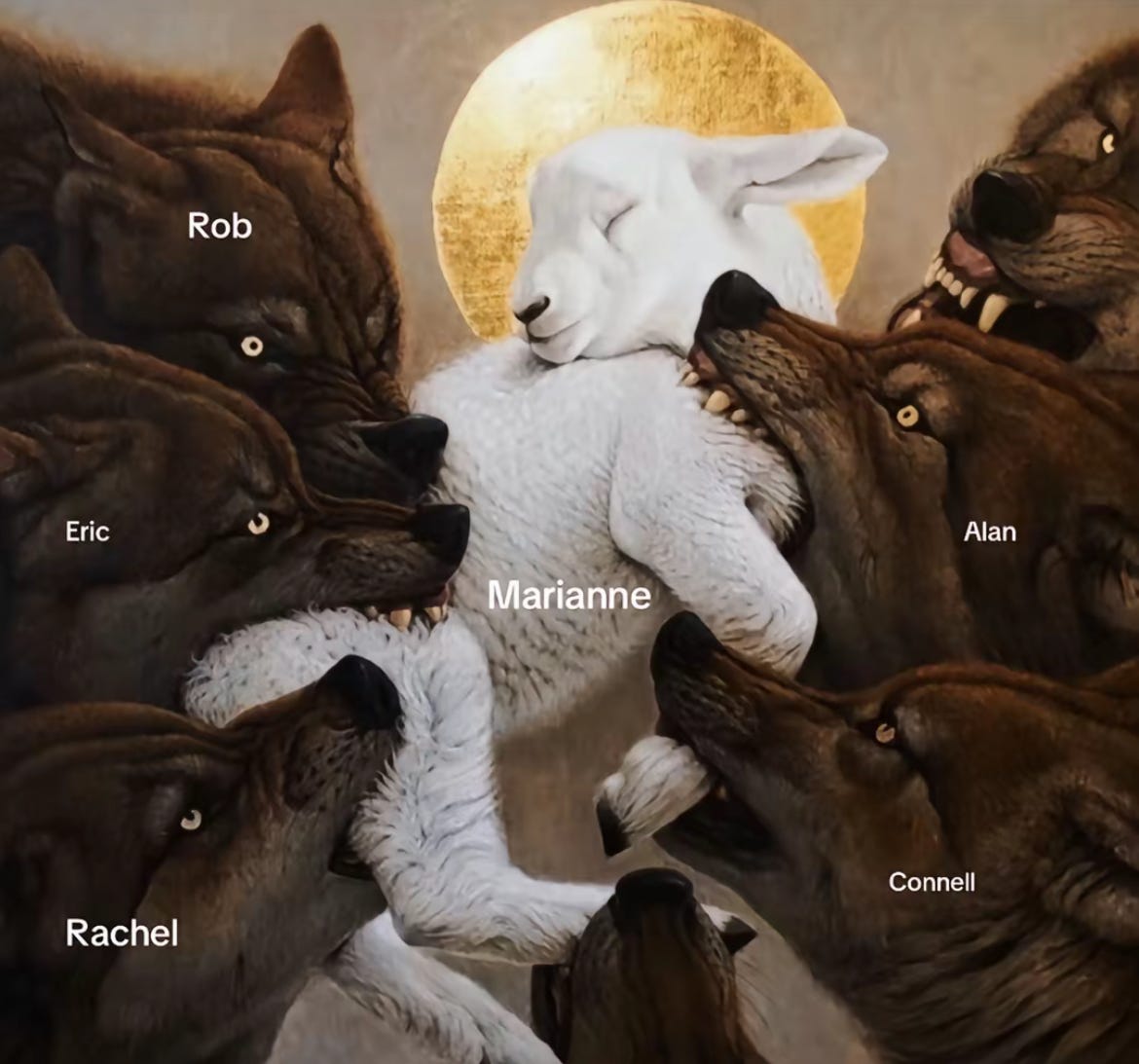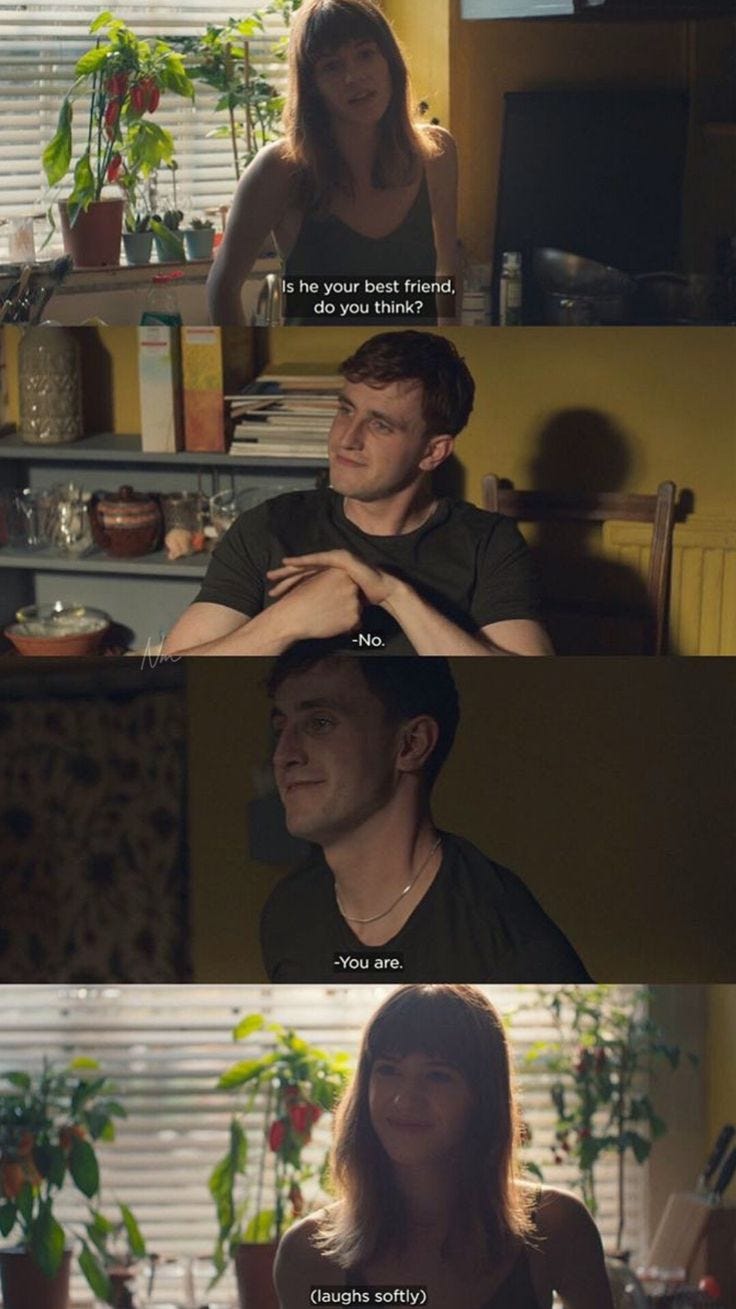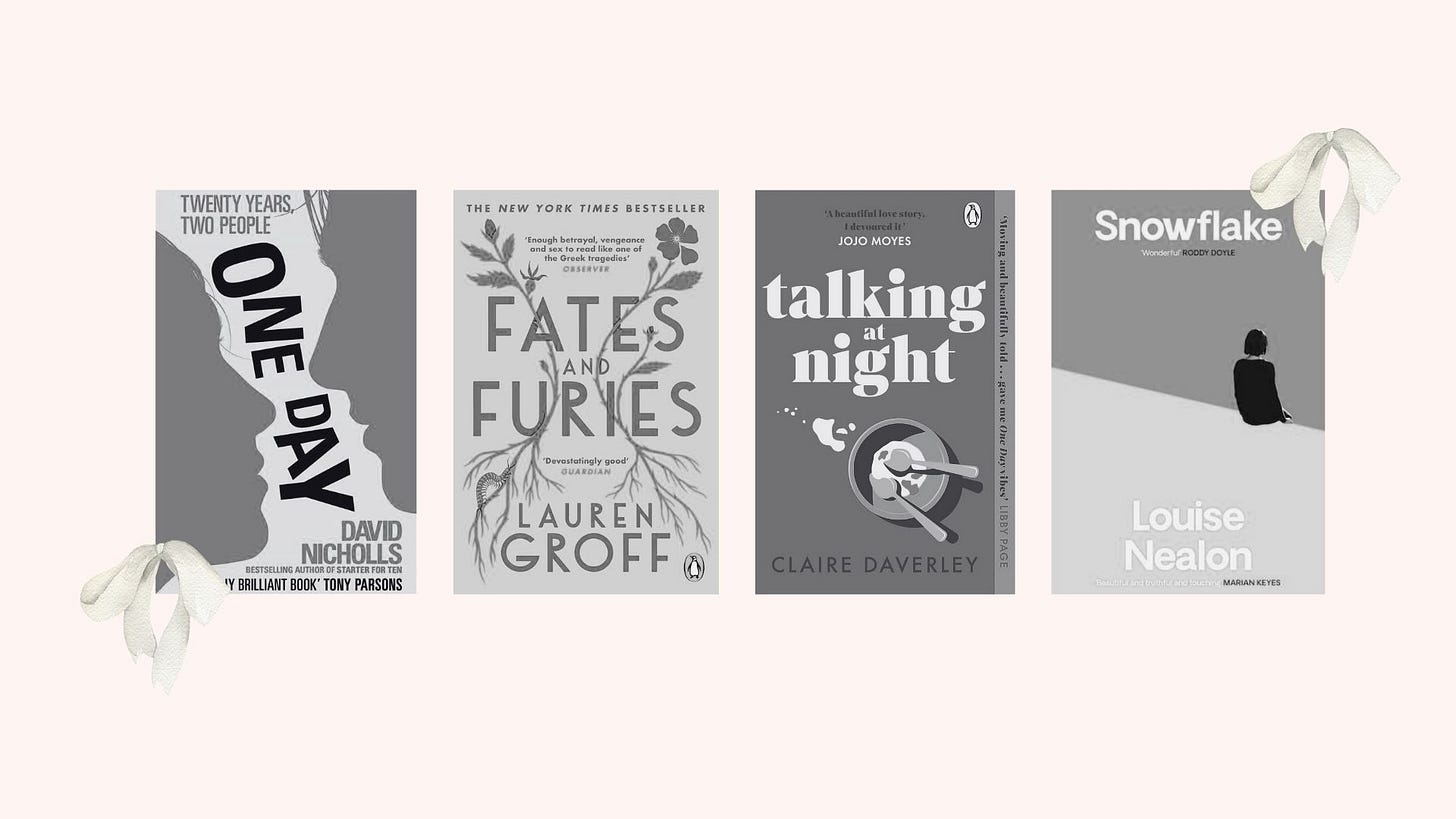In The Margins: in favour of Rooney's miscommunication
On the all-consuming beauties and complexities of love in Sally Rooney's 'Normal People'
Connell and Marianne’s love is a force; inevitable and consuming, beautiful and ruinous. Their quiet intensity, through longing glances, inevitable reunions, and a devout friendship, creates a narrative that refuses an easy definition. Raw, messy, and achingly real - a love I will always defend against criticism. There is something so fragile about their connection, like it could shatter or endure forever with equal ease.
Whether on page or screen, Sally Rooney’s Normal People portrays love as an evolving force, deeply intertwined with identity and self-worth. As they both undergo individual self discoveries, Marianne and Connell find pieces of themselves in each other that comfort them in the chaos of everything else. As I look at my bookshelf lined with 5 different copies of the same book, I feel the urge to read the love story all over again. To have a favourite book is one thing, but to feel entirely consumed by and obsessed with a story is another.
Normal People authentically reminds us that love, in all its forms, is messy, complex, and often painful - and yet it is also the thing that makes us feel the most alive.
The ‘Receiver’ and ‘Giver’ Dynamic
The nature of Connell and Marianne’s love is confusing. Whilst a dynamic is seemingly established from the first line of the book, “Marianne answers the door when Connell rings the bell” (Rooney, 1)1, their dynamics evolve as they age, taking turns being the one who needs and the one who gives.
In the high school years, Marianne is in desperate need of love as she is considered “an object of disgust” (Rooney, 3) by her peers and suffers emotional abuse at home. Although Connell treats her badly, as he reflects on later in the novel, he gives her moments of solace and intimacy that distract from the overwhelming loneliness of her world.
These years in Normal People are not episodes that I choose to watch for comfort. They belittle my argument of the enduring love, with Connell Waldron embarrassing both Marianne and me; I push to everyone that their love story is my favourite, and then they are immediately put off by his actions in the first few chapters. During this time, he hurts her emotionally through his insisted secrecy of their relationship, mirroring the image of the wolf in Korobov’s painting “Agnus” that bites the leg of the lamb. Connell’s actions, rooted in his insecurities and anxieties, inflict a quiet but profound pain on Marianne. Yet, her emotional vulnerability welcomes this pain as it coincides with moments of love that she doesn’t experience elsewhere. This feeling is most notably captured as Rooney writes that “she would have lain on the ground and let him walk over her body if he wanted, he knew that” (Rooney, 34). These moments build the intensity of their relationship that allow it to become so deeply intimate and beautifully poetic later in the novel, establishing the intertwining of love and pain - where tenderness exists alongside wounds. The juxtaposing ideas of beauty and destruction, heal and hurt, allow Rooney to build a complex relationship that makes room for the flaws of individuals in a real and raw way.
When they reunite at Trinity College, the power dynamic shifts. Marianne, now thriving in an environment where her intellect and independence are admired, becomes the one who offers Connell a sense of belonging as she introduces him to her social circles. During this time, Connell struggles with his mental health due to the alienation of university life and his lower class struggles in an upper class world. Marianne is generous in her sharing of her life with him despite the fact that he held her in isolation previously, showing her deep love for him that transcends actions made in their adolescence.
The pendulum of need and care continues to swing between them. When Connell sinks into a depression after the death of a close friend, Marianne becomes the companion that Connell so needs.
Then, as Marianne suffers abuse at the hands of her brother in a climactic scene, Connell rushes to Marianne’s aid and provides her with a safe environment to live in, now emotionally available to offer her the love she needs through physical touch and attentive care.
These shifts highlight the inherently uneven, fluid nature of love. Many ‘BookTok romance’ books being written and praised in the past few years often write of a man taking care of a woman solely, with her struggles being his duty to immediately extinguish, and yet Rooney’s authenticity comes from this changing dynamic where two people’s love for each other results in cyclical giving and receiving, resisting the urge to romanticise the messiness of all the externalities that affect the protagonists. Their relationship is not defined by grand gestures of easy resolutions, but rather by their simple togetherness and acts of service. Helen Holmes agrees that “it’s in the words and actions that pass between them […]; the pliable mists of discourse and desire that grasp us and let us go intermittently and inelegantly” (Holmes, Observer)2. This highlights the cyclical, emotional turbulence of their relationship, reflecting the inherent messiness of human relationships. This is what makes Normal People so deeply romantic to me; their love is infinite not because it is constant, but because it is resilient.
The Reckless Inevitability of Connell and Marianne
Veronica Suchodolski writes that Rooney provides a “delightfully frustrating will-they-won’t-they romance between the two, echoing Jane Austen in the way that characters miscommunicate […] until the readers want to reach into the pages and throttle them into a resolution” (Suchodolski, Observer)3. The miscommunications frustrate the readers, making many question whether they truly belong together or not. This dynamic, alike to Jane Austen’s romances, are so frustrating because it feels so inevitable.
Their love is gravitational, pulling them together in a way that feels both fated and self-destructive.
Even when they part ways, dating other people, their connection remains unbroken, lurking in the corners of one another’s lives. It is not simply defined as a sexual relationship or the comfort of habit - there is something essential about their relationship that they can’t find in other people.
This inevitability, though reckless, is not destructive for the sake of drama. They disregard the stability of their own lives and the feelings of partners as they lose themselves in each other. When they are with other people - like Connell’s relationship with Helen or Marianne’s time with Jamie or Gareth - their partners sense the pull between them. Helen, for example, represents domesticity and stability for Connell, and yet he is unable to be present for her due to his haunting feelings for Marianne.
When Helen speaks badly of Marianne, Connell finds himself “feeling suddenly cornered and regretting that he had let his guard down” (Rooney, 168), intertwining his insecurities with Marianne’s own. Their destiny is so deeply entangled that his emotional state is linked to hers, rejecting the bullying perhaps as a response to his knowledge of the pain that Marianne endured during her high school years, having absorbed this trauma alongside her as a caregiver and as a guilt response. This exists out of any logic or fairness to Helen, who is a much stronger woman than me if my boyfriend was acting like that.
And yet this reckless inevitability creates a Shakespeare-esque blend of beauty and tragedy in their story in a way I can rarely seem to find in literature. On one hand, there is a magical beauty in how their love refuses to be denied, no matter the obstacles or the time apart. Nothing about their love is fleeting or superficial - they don’t have a meet-cute or a specific romance trope as we see so often in modern romance literature. Their love is a deep, raw understanding of one another, becoming an anchor through the devastations of society.
In their most tender moments, there is an undeniable sense of peace, as though they have found both their truest selves and their best friend in one another.
Their love is destined to persist, and in that persistence, there is something deeply romantic. Some loves are simply too powerful to be erased or ignored.
Loving and Leaving
Rooney’s novel originally ended with the observation that “they’ve done a lot of good for each other. Really, she thinks, really. People can really change one another. You should go, she says. I’ll always be here. You know that.” (Rooney, 266). However, in the BBC adaptation, the script is adapted to the iconic lines:
“I’ll go.”
“And I’ll stay. And we’ll be okay.”
For me, the novel reflected a peaceful separation, where love doesn’t always need to be possessive or tangible to be meaningful. The devastation is quieter, more internal, and speaks to the recognition that their shared love will always remain an essential part of who they are.
However, the BBC adaptation intensifies the emotional weight of their relationship, leaving many viewers distraught at their parting. The creative addition of the final line “and we’ll be okay” introduces an optimistic affirmation of their love. They have gotten through hard times together and by this episode, they have broken down the wall and learned to effectively communicate their feelings. It is because of this that Marianne knows the connection between the two will ‘be okay’ and get them through their futures, though ambiguous to what those futures may hold.
One Reddit user comments that it is “like a breath of fresh air when they finally understand each other’s roles in their lives” (pepper-1023 on Reddit)4. Their resilience has fostered a loving relationship between the two since 2011, and their separation in 2015 will be no different as their emotional strength has already been tried and tested. It is truly ‘a breath of fresh air’ to see two deeply flawed individuals who have caused such turmoil between one another finally feel contentment and peace within themselves. They have dismantled the ‘receiver and giver’ dynamic; they are no longer in need of the validation of the other, but rather just content with their soul ties that they will carry with them for life. After years of unhappiness in both Carricklea and Dublin, Connell has helped Marianne so deeply that she is able and willing to live a slow life where she is without having to impulsively move to New York with Connell to seek out new thrills of validation. She is right in that “they have done a lot of good for each other” (Rooney, 266) as we can see that Marianne has found strength in herself and no longer requires external validation to feel whole. Similarly, Connell is learning to move beyond his limitations, pursuing his dream of writing despite his previous setbacks and insecurities.
Their love, whilst disorderly, painful, and at times impossible, is ultimately transformative. They have been the catalysts for one another’s healing, growth and self acceptance, and that is the true, beautiful effect of love. Rooney herself states that “what is really intrinsically human is the ability to love and sacrifice yourself for another person” - whilst noticing and acknowledging the cruelty of humankind, Rooney truly believes that “without constraints, we can actually love each other” (Gilbert, The Atlantic)5.
And whilst we’ll never know, and I simply do not want to know, if their paths would ever align again, the love that Connell and Marianne shared will forever be a quiet, steady flame that neither time nor distance can extinguish.
Book Recommendations (if you enjoyed Normal People)
One Day by David Nicholls
Talking at Night by Claire Daverley
Conversations With Friends by Sally Rooney
Writers and Lovers by Lily King
Fates and Furies by Lauren Groff
Trespasses by Louise Kennedy
Snowflake by Louise Nealon
Me Before You by JoJo Moyes
Rooney, Sally. Normal People. Faber & Faber Ltd, 2018.
Holmes, Helen. “In Hulu’s ‘Normal People,’ Even Your Soul Mate Can’t Save You from Yourself.” Observer, May 2020, observer.com/2020/05/normal-people-hulu-different-from-sally-rooney-book-review/. Accessed 4 Dec. 2024.
Suchodolski, Veronica. “Why Calling Sally Rooney a ‘Millennial Novelist’ Does Her a Disservice.” Observer, 10 Apr. 2019, observer.com/2019/04/sally-rooney-is-more-than-a-millennial-writer-normal-people-shows/. Accessed 3 Dec. 2024.
pepper-1023. “Normal People Ending Thoughts.” Reddit, 2021, www.reddit.com/r/NormalPeopleBBCHulu/comments/l4m8no/normal_people_ending_thoughts_possible_spoilers/. Accessed 4 Dec. 2024.
Gilbert, Sophie. “The Irresistible Intimacy of Normal People.” The Atlantic, 30 Apr. 2020, www.theatlantic.com/culture/archive/2020/04/hulu-normal-people-sally-rooney-radical-romance/610921/?utm_campaign=later-linkinbio-theatlantic&utm_content=later-6850081&utm_medium=social&utm_source=instagram. Accessed 4 Dec. 2024.













